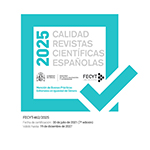La cuantificación a pedazos o cachos: Los “nombres de tamaño” como cuantificadores de grado en variedades orales del español europeo contemporáneo
Resumen
El artículo delimita las áreas dialectales de los sustantivos partitivos cacho, pedazo (y trozo) y sitúa en la variedad urbana el foco de creación y difusión de su conversión en cuantificadores de grado adnominales (cacho de idiota, pedazo de chalé). Además, el presente artículo afronta el proceso de “desemantización” o “abstracción” de los rasgos léxicos que afectan a este tipo de sustantivos cuantificativos descritos operativamente en el trabajo como “nombres de tamaño”. En línea con investigaciones anteriores sobre expresiones elativas del español, el artículo propone la emergencia de un “rasgo de maximalidad” (rasgo [max]) como hipótesis principal para explicar el comportamiento cuantificador de estos términos. El análisis se basa en un corpus empírico extraído de registros orales del español europeo contemporáneo, junto con datos tomados de muestras de "oralidad fingida".
Descargas
Descarga artículo
Licencia
La revista Dicenda. Estudios de lengua y literatura españolas, para fomentar el intercambio global del conocimiento, facilita el acceso sin restricciones a sus contenidos desde el momento de su publicación en la presente edición electrónica, y por eso es una revista de acceso abierto. Los originales publicados en esta revista son propiedad de la Universidad Complutense de Madrid y es obligatorio citar su procedencia en cualquier reproducción total o parcial. Todos los contenidos se distribuyen bajo una licencia de uso y distribución Creative Commons Reconocimiento 4.0 (CC BY 4.0). Esta circunstancia ha de hacerse constar expresamente de esta forma cuando sea necesario. Puede consultar la versión informativa y el texto legal de la licencia.









